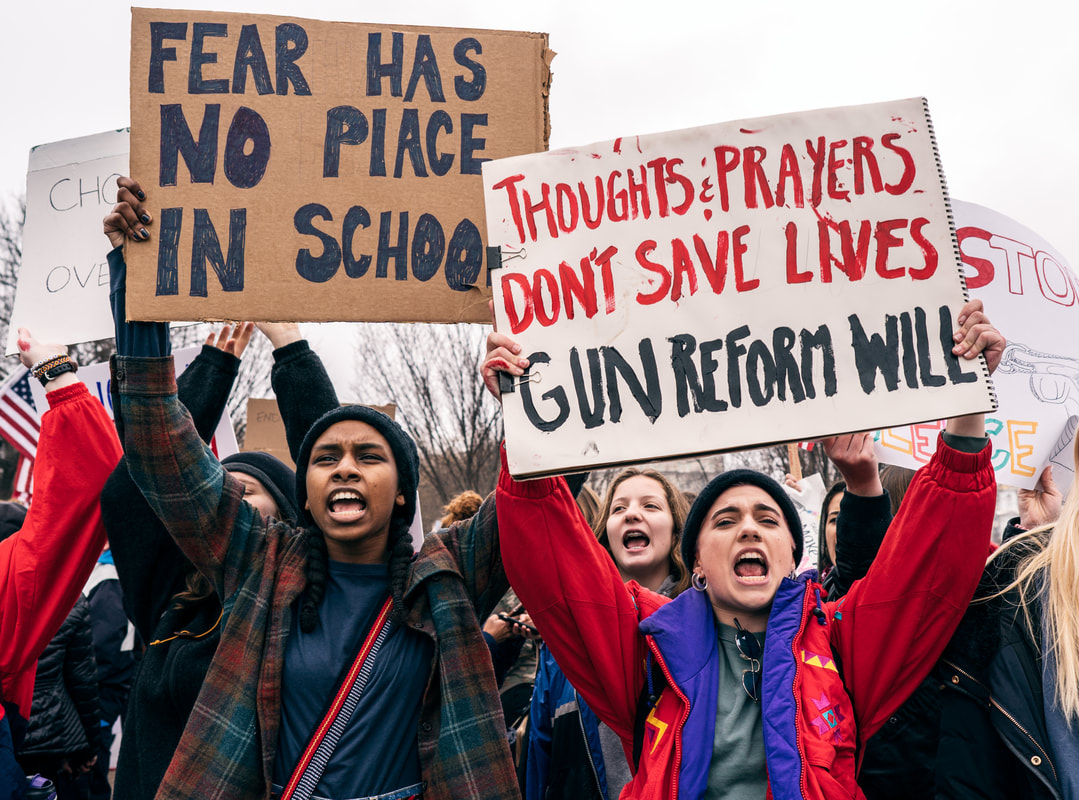No one thinks of youths as leaders; the claim is that they lack experience, and therefore don’t know what they’re talking about. But these kids were eyewitnesses to a mass shooting, saw their friends and teachers killed, and hid in closets to protect themselves. What better experience is there than that to understand the danger of assault weapons? What other kind of knowledge could these politicians be seeking?
The last several years have been defined by political rancor, the murders of people of color at the hands of police, and mass shootings. Immediately following these incidents comes what seems to be our defining cycle of violence: the feedback loop of thoughts and prayers versus calls for action by authentic leaders. Each time we bear witness to a shooting, we shudder, maybe hold our breath, wonder when this cycle will break, and when it might affect us directly, close to home. We look to our elected leaders to spearhead this change, and yet each time we are instead met with platitudes about the impossibility of reform. Instead, we hear that these deaths shouldn’t be politicized, and we feel stuck. It’s like the gas pedal and the brake are jammed at the same time. We are caught in the freeze response.
What do we do when we feel stuck in this cycle of violence? What do we do when we feel let down, deeply disappointed by our elected leaders?
When terrible things happen, our peace is stolen from us. Most people want to build peace back into their lives and communities. At the foundation of peacebuilding is the need for safety. In an emergency, the first priority is to get to a place of safety, and from this safe place we can assess the situation and begin to repair it. But we often feel unsafe after the emergency ends. It is then that we turn to others we trust for support to help us build peace back into or lives. This is when we turn to leaders, to ensure that we are protected from future harm.
These students from Parkland, Florida prepared speeches and talking points, met with state politicians from both parties, and asked them to consider legislation that would ban assault weapons like the one used in the shooting they witnessed. But in the initial session, Florida lawmakers voted against a bill that would outlaw assault rifles. These leaders chose to reject a measure that would play a part in restoring safety to their constituents’ lives.
There are, of course, different kinds of leaders. There are the leaders elected on the promise of representing the will of the voters; the leaders in our communities who listen to the needs of their neighbors; and the leaders in our spheres of influence who inspire us with confidence. And there is, of course, a plethora of ways to lead. We hope that our leaders are authentic: that they listen to our requests and value our input, that they represent our best interests. But there are times when our elected leaders fail us. When leaders value profit over input, or when they refuse to listen to those they represent, they are inauthentic leaders. This inauthenticity takes away our sense of safety, and we are once again stuck in the cycle.
But we are not stuck with inauthentic leaders.
In explaining his lack of support for banning assault weapons, a prominent state politician told Parkland students that the AR-15 should be accessible as it is occasionally used to hunt boar, and that “being in elected office, you have to be very, very, very careful how much authority and power you bring to government. The greatest atrocities known to mankind have been committed by governments.”
There is an inherent dishonesty in this leader’s statement: we understand that the defense of the AR-15 is not about hunting boar. We understand a different meaning of being careful with the authority and power of government. We see the deep irony in claiming that taking action would be an atrocity, while being called upon by the very people who have survived the atrocity of seeing their friends and teachers killed by the weapon in question. The trust in these leaders is broken when they fail to listen to the requests of future constituents before them. This broken trust renders this type of leadership inauthentic.
By confronting lawmakers over why they support the sales of assault weapons, the youth of Parkland are forcing politicians to give dishonest, inauthentic answers. Through persistence and using their voices, by stepping up when no one else does, by using their knowledge and experience as nonviolent power to confront inauthentic leadership, these young people are the authentic leaders in the push for gun control legislation. This is peacebuilding.
When terrible things happen, peacebuilding happens when authentic leaders speak truth, demonstrate mercy, demand justice, and build peace. We at Minnesota Peacebuilding Leadership Institute instigate, train, support, and stand with authentic leaders who engage in nonviolent direct action to transform individual and collective traumas into nonviolent power with positive, productive alternatives to revenge. Peacebuilding is authentic leadership. We call upon all leaders to examine themselves and choose the authentic way.


 RSS Feed
RSS Feed